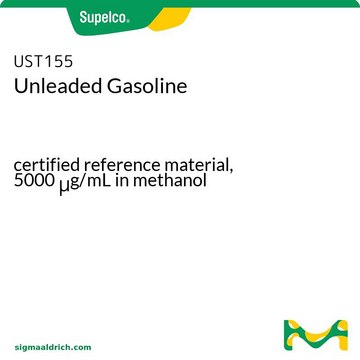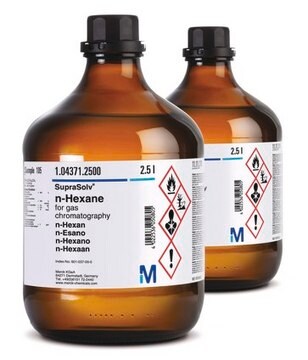24587
Petroleum ether
puriss., low boiling point hydrogen treated naphtha, meets analytical specification of DAB, bpmin. 75% 40-60 °C (min. 75%)
Synonym(s):
Petroleum benzin
About This Item
Recommended Products
vapor density
2.5 (vs air)
Quality Level
vapor pressure
25.8 psi
grade
puriss.
form
liquid
quality
meets analytical specification of DAB
impurities
≤0.001% benzene (GC)
≤0.001% non-volatile matter
≤0.005% S-compounds (as S)
≤0.01% water (Karl Fischer)
≤2% n-hexane (GC)
bp
40-60 °C (min. 75%)
density
0.642-0.656 g/mL at 20 °C
Looking for similar products? Visit Product Comparison Guide
Application
- Bioassay-Guided Skin-Beneficial Effects of Fractionated Sideritis raeseri subsp. raeseri Extract.: This study explores the skin-beneficial effects of Sideritis raeseri, using petroleum ether for the fractionation of active components, showing potential in dermatological applications (Krgović et al., 2022).
- Physico-Chemical Analysis and Fatty Acid Profiling of Fenugreek (Trigonella foenum-graecum) Seed Oil Using Different Solvents.: This research assesses the impact of various solvents including petroleum ether on the extraction and fatty acid profile of fenugreek seed oil, emphasizing analytical techniques in chemical analysis (Munshi et al., 2020).
- Poplar bark lipids enhance mouse immunity by inducing T cell proliferation and differentiation.: The study investigates the immunomodulatory effects of lipids extracted from poplar bark using petroleum ether, underscoring its utility in biochemical extractions (Tang et al., 2020).
- Phytochemical screening, cytotoxic and antimicrobial activities of Limonium socotranum and Peperomia blanda extracts.: This article details the use of petroleum ether in the extraction process for studying the cytotoxic and antimicrobial properties of Limonium socotranum and Peperomia blanda (Al-Madhagi et al., 2019).
- The study of metabolites from fermentation culture of Alternaria oxytropis.: Focuses on identifying metabolites in the fermentation culture of Alternaria oxytropis, with petroleum ether used to extract lipid-soluble compounds, enhancing understanding of microbial metabolism in an analytical context (Song et al., 2019).
Other Notes
The article number 24587-4X5L-R will be discontinued. Please order the single bottle 24587-5L-R which is physically identical with the same exact specifications.
The article number 24587-6X1L-M will be discontinued. Please order the single bottle 24587-1L-M which is physically identical with the same exact specifications.
The article number 24587-6X1L-R will be discontinued. Please order the single bottle 24587-1L-R which is physically identical with the same exact specifications.
Signal Word
Danger
Hazard Statements
Precautionary Statements
Hazard Classifications
Asp. Tox. 1 - Carc. 1B - Flam. Liq. 2 - Muta. 1B - Skin Irrit. 2
Storage Class Code
3 - Flammable liquids
WGK
WGK 3
Flash Point(F)
<-40.0 °F - closed cup
Flash Point(C)
< -40 °C - closed cup
Certificates of Analysis (COA)
Search for Certificates of Analysis (COA) by entering the products Lot/Batch Number. Lot and Batch Numbers can be found on a product’s label following the words ‘Lot’ or ‘Batch’.
Already Own This Product?
Find documentation for the products that you have recently purchased in the Document Library.
Customers Also Viewed
Our team of scientists has experience in all areas of research including Life Science, Material Science, Chemical Synthesis, Chromatography, Analytical and many others.
Contact Technical Service



